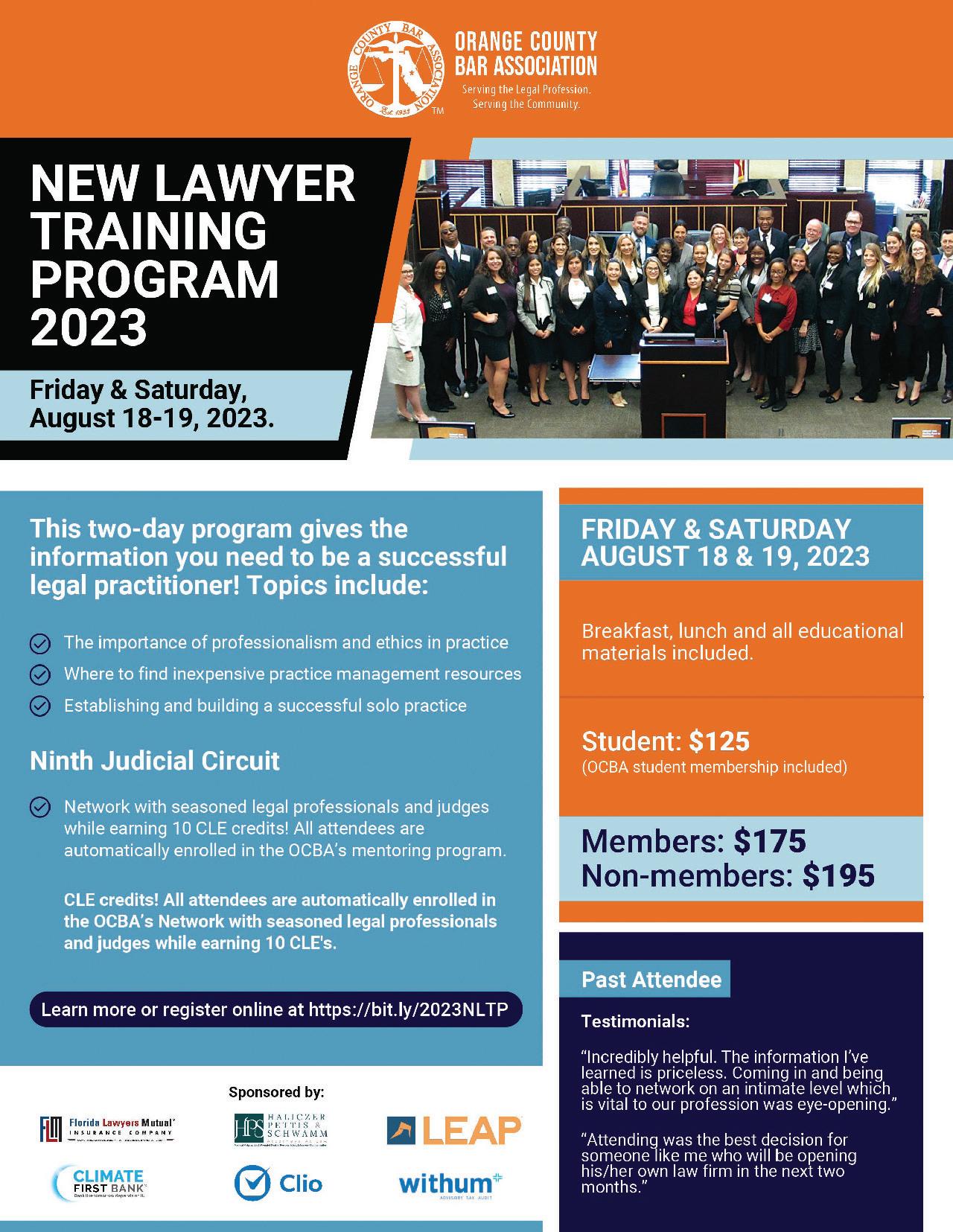
4 minute read
Chief’sColumn Circuit Criminal – Old Problems, New Solutions!
The effects and backlog of cases after the Covid pandemic in the court system throughout the state is well-documented and commonly referred to as the “Covid Backlog.” In our circuit, no division was spared, including circuit criminal.
Protocols created due to the pandemic required the criminal division to really rethink ways that our resources can best be utilized and operate most effectively. It presented us with an opportunity to learn from our past and innovate for the future. One such innovation was the creation of the Post-Conviction Relief (PCR) Division.
This division is designed to address the motions filed in cases where defendants allege that, among other things: their convictions were attributed to ineffective assistance of counsel, an illegal sentence was imposed, or there is new evidence discovered in their cases that would have resulted in a different outcome at trial (had that evidence been discovered at the time of trial).
Most people are aware of the backlog in active pending criminal cases that was created by the inability of the courts to conduct in-person hearings and jury trials because of Covid. What many who do not practice criminal law may not be aware of, is that a separate, different backlog was growing, even after the courthouse had re-opened in a limited capacity.

The Department of Corrections halted the transportation of inmates from the state prisons to the county jails during the pandemic citing health concerns and fear of creating an outbreak in the prison system. These prison transports often consist of a series of stops at multiple facilities where inmates are picked up and dropped off. Inmates are all placed in a transport vehicle – a confined space – for long periods of time. This ‘freeze’ of prison transports extended well beyond the time we resumed conducting jury trials under our local Covid protocols. These PCR hearings require the presence of the party seeking relief, so obviously these hearings could not go forward, but new filings were still being received. Hence, the backlog continued to grow with little that could be done to resolve PCR motions that were already pending. PCR motions, when the circumstances are appropriate, require lengthy evidentiary hearings. The challenges of getting the motions heard can vary, but require many moving parts to sync up, and can often create a logistical nightmare. Many of these motions require the availability of the original criminal defense attorneys who represented the defendant at trial, including public defenders with very busy caseloads. All too often, hearing dates conflict with trials that render the original trial attorneys unavailable on short notice. In addition, the State Attorney’s Office is required to respond and defend against these collateral attacks on the convic- tions obtained by their office. In the past, Assistant State Attorneys were often assigned multiple PCR motions across 11 different criminal divisions. Finally, there may be other witnesses and experts whose schedules have to be taken into consideration when coordinating hearing dates.
These limitations, coupled with the sheer amount of time these hearings require, add to the difficulty in bringing these motions to hearing. A “short” hearing in this context is approximately 3-4 hours. Longer evidentiary hearings may take 8 hours or several days. Keep in mind that prior to June 1, 2022, a regular criminal division (which handles an average of about 500-600 active trial cases) would also be assigned approximately 60-80 of these pending PCR motions, at any given time.
Extended hearings for PCR motions require significant advanced scheduling. You are competing, in a sense, for hearing time with bond hearings, motions to suppress, pleas, scheduling conferences for competency hearings, violation of probation hearings, and trials. In the past, after all the potential conflicts were dealt with, these hearings would be set several weeks or months in advance. Often, they were canceled at the last minute because an essential witness, like the original trial counsel, was required to appear for trial where they are lead counsel. In those circumstances, this extended hearing time could often not be repurposed for another matter due to the last-minute cancellation. Meanwhile, the PCR motion remained pending, resulting in a significant and unfortunate waste of time and resources. I wish that I could say this was an uncommon occurrence, but many PCR hearings were canceled and reset several times, resulting in several months passing before an evidentiary hearing could take place.
So, the problem was clear. The solution, while not an entirely new concept, was to create a division dedicated exclusively to addressing post-conviction motions and this backlog. While this meant that we would be closing a trial division, each division would reassign its PCR motions to this new division, and in exchange receive a share of the former division’s pending trial cases (about 70-80 cases per division).
In creating this division, we eliminated the conflict in scheduling PCR hearings among 11 different criminal divisions. It also developed consistency and predictability in procedures since all motions are now handled by the same judge. This division conducts case management, sets deadlines, appoints counsel when appropriate, and deals with scheduling issues in a seamless fashion, so that a hearing can be reset to take place within days of the original date. It consolidates the efforts of our already overworked staff attorneys; they are no longer required to report to 11 different judges on these motions.
I am happy to report that in the approximate year the PCR Division has been in operation, we have significantly reduced the backlog in pending post-conviction motions by almost half. Furthermore, because of the efficiency in handling the PCR docket, we have been able to aid the other criminal trial divisions by providing trial assistance and hearing coverage. The PCR Division continued page 10
TO TREAT YOUR CLIENTS AS WELL AS YOU DO.
New Members
Regular and Government
Alexander William ADESEYE
Samantha I. ARREGUI
Lauren E. BEAMES
Talia BOIANGIN
Brooke India CHARLAN
Michael S. DAWKINS
Cecilia FORD
Michael FRIEDMAN
Erica D. GLOVER
Taylor A. GUZY
Amir A. ISAIAH
Erik A. JENKINS
Gregory E. JORDAN
Janice D. KERR
William KIM
Brianna D. LOHMANN
Michelle E. MISSIGMAN
Melissa MUNROE
Derrick S. NATAL
Larissa Jean OWENS
Luis Miguel PEREZ
Winifred H. QUINLAN
ADRsource is pleased to announce that OCBA member Bob Henry has joined our panel of distinguished neutrals and is available to mediate in-person and online
Bob, has been a Florida Supreme Court Certified Circuit Civil Mediator since 2006. Over the course of four decades of trial practice, Bob has gained insights that help him assist parties in the effective resolution of disputed claims. Put Bob’s experience in tort and commercial litigation and dispute resolution to work for you and your clients.
To learn more about Bob and to schedule a mediation please visit: adrsource.com or call 888.741.2224 and

Solving the world’s problems…one case at a time.

Alexis RALLIS
Meghna M. RAO
Youstina REZKALLA
Lucie ROBINSON
Marcela ROMERO-MOSQUERA
Jacklyn SIGNORELLI
Paul B. SLADEK

Erin E. TUCK
Evelyn M. VERAS
Danielle S. WHITE
Austin M. WILLIAMS
Emeritus
Qinghe LIU
Law Student
Faith PELTON
Lauryn PRUITT
Reggi SIMMONS
Madison E. WELLS
Paralegal Student
Camellia OLDS









